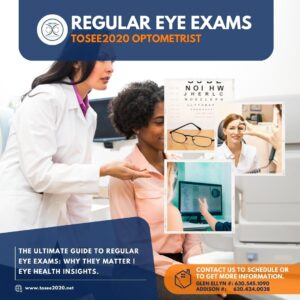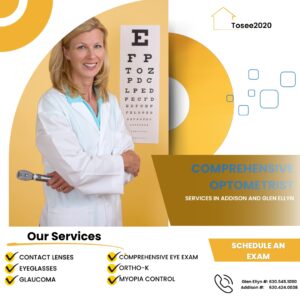Discover the Significance of Routine Eye Exams for All Ages: A Comprehensive Guide to Eye Health
Our eyes are our windows to the world, allowing us to experience life’s beauty, colors, and wonders. Yet, all too often, we take our precious vision for granted, neglecting to give our eyes the care and attention they deserve. Routine eye exams, a critical component of overall healthcare, are often overlooked until vision problems become too noticeable to ignore. This comprehensive guide will delve into the profound importance of routine eye exams for individuals of all ages. From children to seniors, understanding the significance of regular eye check-ups can safeguard our vision, enhance our quality of life, and detect potential health issues beyond our eyes.
-
The Eyes: Mirrors to Our Health:

Our eyes are extraordinary organs, offering insights into our overall health that extend far beyond mere vision. Routine eye exams are like health check-ups for our eyes, allowing optometrists to detect signs of various systemic diseases. Conditions such as diabetes, high blood pressure, and multiple sclerosis can manifest through changes in the blood vessels, retina, and optic nerve, all of which are examined during a comprehensive eye evaluation. By identifying these warning signs early, healthcare professionals can initiate timely interventions, potentially preventing more severe health issues.Read More Click Here
-
Childhood Vision Development:
Childhood is a pivotal time for visual development, making early eye exams crucial. These exams can uncover vision problems that, if left unaddressed, may hinder a child’s learning and development. For instance, amblyopia, commonly known as “lazy eye,” occurs when one eye doesn’t develop the same visual acuity. Strabismus, or crossed eyes, can also affect a child’s depth perception and eye coordination. Regular eye exams during childhood can detect and correct these conditions, helping to ensure that a child’s vision and visual-motor skills develop optimally, setting them up for success in school and life.
-
Preventing Age-Related Eye Conditions:
The risk of developing eye conditions such as cataracts, glaucoma, and age-related macular degeneration increases as we age. Routine eye exams are essential for detecting these conditions in their early stages when treatment is most effective. Regular exams can help preserve seniors’ independence and quality of life by ensuring clear vision.
-
Digital Eye Strain and Modern Lifestyles:
In today’s digital age, many spend a significant portion of their day in front of screens—computers, smartphones, or tablets. Prolonged digital device use can lead to a condition known as digital eye strain or computer vision syndrome. Symptoms may include eye fatigue, dryness, headaches, and blurred vision. Routine eye exams can address these symptoms by ensuring that your eyes function optimally and that your prescription is up-to-date. Optometrists can also guide your workspace’s ergonomic adjustments and recommend specialized eyewear, such as computer glasses, to reduce digital eye strain’s impact. By addressing these issues proactively, you can alleviate discomfort and protect your long-term eye health in the context of modern lifestyles.
-
Eye Health Across the Lifespan:
Eye health must evolve across the lifespan, and routine eye exams adapt to address these concerns. Young adults and professionals may prioritize optimizing their visual performance for work and daily life. As they enter their senior years, eye exams become comprehensive evaluations that monitor for age-related conditions like cataracts, glaucoma, and AMD. These evaluations ensure that seniors maintain clear vision and eye health, which, in turn, contributes to their continued independence and quality of life. Adolescents and young adults may require specialized exams for contact lens fitting, myopia control, or sports vision enhancement. The flexibility of routine eye exams means that every individual can receive the tailored care they need at each stage of life.

-
Vision and Quality of Life:
Vision is a cornerstone of our overall quality of life. Clear, comfortable vision enables us to perform daily tasks, engage in activities we enjoy, and confidently navigate the world. Routine eye exams are pivotal in preserving this aspect of our well-being. By addressing visual discomfort, ensuring optimal vision, and facilitating early intervention when problems arise, these exams contribute to a higher quality of life. Good vision allows us to excel in our careers, absorb knowledge through reading and learning, maintain safe and independent living, and fully enjoy life’s pleasures, from appreciating art and nature to participating in sports and social activities.
Conclusion:
Routine eye exams are a cornerstone of preventative healthcare, transcending age boundaries to protect and enhance our most precious sense: vision. They serve as a proactive means of preserving eye health, detecting systemic diseases, and maintaining our overall quality of life. Whether you’re a child embarking on a learning journey, a working professional navigating the digital age, or a senior cherishing the beauty of life’s twilight, regular eye exams are your path to clear vision and optimal well-being. Embrace the importance of routine eye exams, for through these check-ups, we unveil a world of lasting clarity, health, and happiness.
